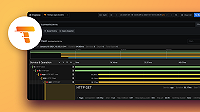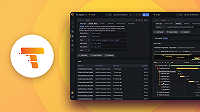Important: This documentation is about an older version. It's relevant only to the release noted, many of the features and functions have been updated or replaced. Please view the current version.
I am getting error message ‘Too many jobs in the queue’
The error message might also be
queue doesn't have room for 100 jobsfailed to add a job to work queue
You may see this error if the compactor isn’t running and the blocklist size has exploded. Possible reasons why the compactor may not be running are:
- Insufficient permissions.
- Compactor sitting idle because no block is hashing to it.
- Incorrect configuration settings.
Diagnosing the issue
- Check metric
tempodb_compaction_bytes_written_totalIf this is greater than zero (0), it means the compactor is running and writing to the backend. - Check metric
tempodb_compaction_errors_totalIf this metric is greater than zero (0), check the logs of the compactor for an error message.
Solutions
- Verify that the Compactor has the LIST, GET, PUT, and DELETE permissions on the bucket objects.
- If these permissions are missing, assign them to the compactor container.
- For detailed information, check - https://grafana.com/docs/tempo/v1.4.x/configuration/s3/#permissions
- If there’s a compactor sitting idle while others are running, port-forward to the compactor’s http endpoint. Then go to
/compactor/ringand click Forget on the inactive compactor. - Check the following configuration parameters to ensure that there are correct settings:
max_block_bytesto determine when the ingester cuts blocks. A good number is anywhere from 100MB to 2GB depending on the workload.max_compaction_objectsto determine the max number of objects in a compacted block. This should relatively high, generally in the millions.retention_durationfor how long traces should be retained in the backend.
- Check the storage section of the config and increase
queue_depth. Do bear in mind that a deeper queue could mean longer waiting times for query responses. Adjustmax_workersaccordingly, which configures the number of parallel workers that query backend blocks.
storage:
trace:
pool:
max_workers: 100 # worker pool determines the number of parallel requests to the object store backend
queue_depth: 10000

